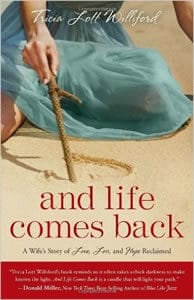John Fuller: Almost every couple experiences a time when they’re just going through the routines of life, and as a couple, they kind of take each other for granted. Tricia Lott Williford remembers a time like that in her own marriage.
Excerpt:
Mrs. Tricia Lott Williford: Before we know it, we have this lens that we view this person through, and it’s no longer one of grace, and it’s no longer one of joy. And when you can’t view life with grace and joy, everything starts to get foggy.
End of Excerpt
John: Well, it can become easy to stop doing the little things to show appreciation for your spouse, allowing grievances to become agitations that turn into arguments. Tricia has an encouraging word for you today to stop and to choose to love. Your host is Focus president Jim Daly and I’m John Fuller.
Jim Daly: You know, John, we can’t always understand why God allows us to go through certain experiences in our lives. We may not understand much of it until we get to heaven. That’s just a simple truth. Tricia Lott Williford went through an unimaginable journey that really took a lot of courage on her part, but God’s love and grace got her through the despair, which is the right outcome, right? Her despair turned into hope, which is what God wants for us as believers. And we always have hope and you’ll find that in the discussion today.
John: It really is an inspiring story and, uh, Tricia is the author of the book And Life Comes Back. She has a blog that you can check out and also is the mom of two boys and we spoke with her a number of years ago but wanted to share that conversation with you once again on Focus on the Family.
Jim: Let’s start by having you tell us a little bit about yourself and your husband Robb’s relationship. What was it like being married to this person?
Tricia: Well, Robb and I were very different people and we met when I was in college. He had just graduated from college and I was just 19-years-old when we started dating. We got engaged really quickly and married a year later. And we were very different people. I am an artist and, um – and I’m super creative and he was just very logically minded.
Jim: You could say it. He was an accountant type or engineer?
Tricia: He was, yeah.
Jim: (Laughter).
Tricia: He was. He just really liked his ducks in a row, and I made him very nervous, because I was just…
Jim: Out of control. (Laughter)
Tricia: …I – I was the mare that was very hard to tame for sure. And so, but one of the things that we used to say was that “he held the string to my kite, and I was the air in his balloon,” because I…
Jim: Huh.
Tricia: …I helped him to stay fun and he kept me from floating away.
Jim: Did you ever think about how God draws opposites together like that? I mean, why does God do that? For irritation or what does He do that for?
Tricia: I think He does that so that we can bring out the best in each other. I think He does that because I think in marriage, we’re living out the great commission…
John: Hmm.
Tricia: …Of – of serving one another and getting to know one another and loving each other the way that God loves us. And so, we bring out the weaknesses in each other and so that they can be healed.
Jim: Ah, now that is describing the happy side of those conflicts, but it isn’t always that way.
Tricia: No, it is not.
Jim: I mean, those differences can really create some friction. Did you have that in your marriage, as well?
Tricia: Oh, yes. Yes, we did. Robb and I, we got married in 2000 and, um , we had some really, really fun years of being newlyweds and then we had the babies and the minivans and the Suburban and the mortgage and all of those things happened, and life started to get really busy. And it seemed like a machine to maintain and – and I discovered somewhere along the line that I had a spirit of ungratefulness…
Jim: Huh.
Tricia: …That had moved in, and that starts to look like criticism. And instead of being thankful, and instead of being so charmed by the idiosyncrasies and quirks of this accountant-like mind that I had married, I just was irritated.
Jim: Did you start feeling some guilt about the way you were feeling?
Tricia: I did.
Jim: And how did God work in you to say, “Okay, take this step. Take this little step, this big step?” What was it like?
Tricia: I decided that I needed to change some things about the way that I was thinking, but I wanted to change it internally. I didn’t even want Robb to know the hard work that I was doing. I just wanted to make it just a quiet discipline. And I think that “discipline” has become kind of a spiritual buzzword in our culture, that – that we have spiritual disciplines that we follow and things that we do. But really, I feel like it’s just wanting to be better and taking one small step in that direction and then another step in that direction, until you discover that you’re on a new path. And so, I decided. I bought a journal, and I decided to write down – my goal was to write down one thing every day that I was thankful for. One thing that I noticed that he did, one thing that blessed me, something that encouraged me, just one thing every day. And so, I started keeping track, and I would write down things like, “Robb brought me flowers today after work.” Or “Robb helped me fold the laundry tonight.” Or “Robb served popsicles to the boys today, and then he wasn’t impatient when they changed their minds and they wanted different flavors.” Or I just started paying attention. “He refilled my Diet Pepsi tonight at dinner.” Small things like that to give me a different lens, a different way of viewing him. And it gave me such a sharp eye, and once I – I realized that once I started looking for one thing every day, then I found three things or five things or six or seven.
Jim: So, it worked.
Tricia: It really did. It – it just transformed my thinking. And it – it gave me grace.
Jim: Yeah, you kept that for about a year, maybe longer, but…
Tricia: Two.
Jim: -Two years and then…
Tricia: Two years.
Jim: …What’d you do with the journal that really made an impact?
Tricia: Well, so, in 2010, uh, it was our 10th anniversary and we decided to go to Mexico for a week to celebrate our second honeymoon. And I had this journal that I’d been writing in since 2008, and these two years of a daily record of me noticing all the things that he had done. And I wrapped it up and I used red sparkle paper and curly wire ribbon…
Jim: (Laughter).
Tricia: …And tucked it into my suitcase and gave it to him on our honeymoon. Um, but he opened this and sat down and read it all in one sitting. Um, and I remember just feeling so touched by that, that this magnitude of, “Oh, he – he can see that I’ve noticed.” And he was thinking the same thing, “Oh, my gosh. She noticed. She noticed.” And on that 10th anniversary, on that second honeymoon, I feel like that was sort of the beginning of our friendship all over again. We fell in “like” again, like “I really like you. I remember why I married you. You’re my friend. You’re my friend. I had forgotten that for a little while.”
Jim: Interesting, that act of kindness is what really rekindled the relationship.
Tricia: Yeah, absolutely.
Jim: That’s probably true of any relationship, isn’t it?
Tricia: Mm hmm. Because what I learned in those two years of keeping track was that I couldn’t change him, but I could change me. And I couldn’t change his patterns and the way that he was wired, but I could change the way that I received his love. And the truth is I – I later learned upon retrospect, that he really wasn’t trying to control. He was just trying to take care of everybody. He was just trying to keep everybody safe. He was just trying to keep the house in order, so that things worked smoothly, so that he could eliminate conflict. I felt like he was creating it, but I wasn’t able to change him, but I could change me.
Jim: Yeah, I can – I can relate to that. Minimize the chaos…
Tricia: Yeah.
Jim: …That’s my goal.
Tricia: Right.
Jim: So, there you were. You had that going on. It was turning a corner. You felt your relationship rekindling after 10 years of hard slugging…
Tricia: Right.
Jim: …And raising the little ones and those things. What happened that kind of threw everything off track?
Tricia: Well, it gets really sad, really fast, because Robb died. And he was, um – it was six months after that – that second honeymoon and we – it was a couple days before Christmas, and, um, the doctors thought that he had the flu and sent us home from the hospital and he died the next morning. And it turns out that he did have the flu, but it was masking sepsis, and he had an infection in his bloodstream.
Jim: Yeah.
Tricia: And, um – he – I want to say quickly to all of the listeners, um, that it’s not – I don’t want you to be terrified of the flu, um, or any of the symptoms therein. Robb had – he was in an accident when he was 14, and he, um, had his spleen removed. And the only reason that you have a spleen is to, I now know, is to hold infection while your body prepares to fight against the infection. So, when the doctors missed this infection in his bloodstream when they sent us home. The infection just went viral…
Jim: Took off.
Tricia: …In his body, attacked his heart and his lungs, and he died the next morning.
Jim: But during that, um, situation, I mean, there were several key moments for you.
Tricia: Yes.
Jim: Um, take us through that. Give us that dramatization of what happened, because I think the way you and Robb were communicating right then is pretty, pretty impactful.
Tricia: Yeah, so I came home. I’m a writer and I was working on several writing deadlines and trying to get them done. It was December 22nd. I was writing through many contracts and papers and things like that, trying to get them done. And I was at Starbucks and working and he texted me and said he wasn’t feeling well. And I came home, um, shortly after that and found him on – in his recliner and, um, covered in blankets and just kind of shaking. And I – I came over and checked on him, and I could tell that this was different from anything that I had ever seen. And so, I thought that – I just didn’t know. I didn’t know what was going on, but the – he – I knew he was in some kind of shock. I took him to the ER, and they ran all of these tests, and, um, like I said, they – they found the flu. They found influenza A, and they said, “He won’t die from this, but he’s going to feel like it.” And they said, “We’re so sorry that your Christmas has been ruined. And this illness runs 10 to 14 days, and so, go home. Quarantine him. Give him lots of Gatorade and popsicles, and we’ll see you in a couple weeks. But he’ll – he’ll be fine.” And they said, “If he has any trouble breathing, call 911.”
Jim: Well, they even said that.
Tricia: They did. They said it was…
Jim: And that’s exactly what happened, isn’t it?
Tricia: That’s exactly what happened. So, they said it was a respiratory flu and that that was the only thing we should watch for.
Jim: My goodness.
Tricia: So, I took him home, and I put him to bed, and I slept downstairs next to the Christmas tree, because the doctor had said he needs to be by himself. And so, I checked on him all throughout the night, and I remember even taking him ibuprofen and I remember him taking it from my hand so carefully so that his fingers didn’t touch mine. And he said, “I feel – this is the most sick that I’ve ever been. I – I feel so sick. You have to not get this. I feel so sick.” And it – I now can look back on that, it was just this last protective act of him saying, “I’ve got to take care of you. You can’t get this.” And when we were in college and when we were first falling in love with each other, we had this little silent code back and forth that, that we could squeeze under the table or in church. And so, he would squeeze my hands three times and that meant, “I love you.” And I would squeeze back twice and that meant, “You, too.” And so, in that night when he was so sick, I came in to check on him again, and he tapped the bed three times. He was just too sick and too weary to even speak.
Jim: Yeah.
Tricia: But he tapped the bed three times to say, “I love you.” And I said, “I love you, too. You’re gonna be okay. You’re gonna be all right. We’ll get through this.” So, he called me, um, at about 4:45 in the morning and I came racing up the stairs as I was answering the phone. He was sitting on the side of the bed and he said, “I can’t slow down my breathing.” And I immediately thought of what the doctors in the ER had said, “If he has any trouble breathing, call 911.” And I said, “Okay, they said that this might happen. They said you might have … okay, I’m calling 911.” And so, he was over here, and he was sitting on the side of the bed and as I’m over here gathering all of these things, I hear this giant crash over here behind me. And it sounded like 200 pounds of potatoes all hitting the ground just in one thud. And I looked back over here to see that he had lost consciousness and he’d fallen out of our bed. And so, I came rushing over, and now I’m screaming into the phone and to the 9 – “You have to come. He’s not conscious. You have to help me. You have to help me.” And they’re telling me what to do, and in that moment, he found consciousness one more time, and he pushed himself up off the floor and he leaned back against the wall and he found me with his eyes, and I just knelt down in front of him, and I was talking to him and listening, trying to find, you know, listening for instructions, and then watching him and he was just right here. And then his breathing changed and then his eyes looked different and – and his color changed, and he made – He had this breath that sounded like someone who’d just sat on his chest. It was just one last exhale, and he just died right in front of me. His spirit just slipped right through my fingers, and I remember just feeling this – this helplessness of knowing. Feeling – I remember feeling, “This is it.” I remember those words being in my mind. And I remember feeling the awareness of, “This is happening right now. This is it. He’s dying and…”
Jim: You felt that finality.
Tricia: I absolutely did, but I also felt, “This is the moment of my marriage vows. This is it. Be here. Be here in every way.” And the paramedics came rushing in to find me doing chest compressions and mouth-to-mouth, and they knelt over me and I remember a paramedic putting his hand over mine and – and another one just lifting me out of the way.
Jim: Yeah.
Tricia: And I remember saying, “Please fix him. Please, please fix him. Please fix him.”
Jim: Yeah.
Tricia: And I went downstairs, and I waited. I waited. And I – I sat at his table in the dining table. And several years before that, I had started, again, along the path of just wanting to be better and just choosing one thing to help me to be stronger and better. I had chosen to start writing down Bible verses. And when you’re a young mom with preschoolers, you just don’t have a lot of time, and so, I would read the Psalms, and I would write down whatever stood out to me, just one verse at a time. And I started writing them on 3 x 5 cards, and I would carry them in my purse. And I opened up this Ziploc bag and I pulled this one out that was Psalm 121, “My help comes from the Lord. My help comes from the Lord. My help comes from the Lord.” And I read it over and over and over again. And a man came downstairs in his uniform and said, “Are you his wife?” “I am.” And he said, “We need to tell you that he has passed.” And I looked down at this card in my hands that said, “My help comes from the Lord.” And I looked back up at this officer and I said, “Okay,” which is never, ever the response that I ever would’ve thought.
Jim: Right.
Tricia: That’s never hap – in all the times when I let fear carry my thoughts away and I would think of, “What if something ever happens to him? I would fall to the floor screaming and crying. I would be a patient myself. I would be an absolutely wreck.” No, in that moment, the Holy Spirit met me there with Scripture in my hands that I had written months in advance, and God met me there and said, “Your help comes from the Lord,” so that I looked at this man who had just found no signs of life in the man that I’d been married to for 10 and a half years, and he said, “I’m sorry. He has died.” And I said, “Okay.”
Jim: Yeah. That confidence though, I mean, what were the other things going on in your mind? I mean, that – seeing that Scripture is certainly an encouragement that your help comes from the Lord, but were there other thoughts and ideas…
Tricia: Oh.
Jim: …That were flooding through your mind?
Tricia: So many. So many. So many. I remember feeling like, “I know Who holds the future and I know that ultimately, we will be okay, but I don’t know what to do next. I don’t know what to do right now.”
Jim: Yeah.
Tricia: And I was so afraid for my children who were still asleep upstairs.
Jim: Yes.
Tricia: Um, they were not yet in kindergarten. They were so little and I called a friend, um, who came and took them to her house for the day for a pajama day and we decided they can watch Christmas movies and have one more day of the old life before I have to tell them what has happened. And I -yes. I was flooded in with so many – I remember thinking “widow.” “Widow.” I remember saying that word. “I’m a widow. I’m 31. Widow.”
Jim: Yeah, boy, I mean, this is touching. The question becomes and it’s the title of your book, And Life Comes Back. What were the subsequent years like? What went on with your boys? What’s happened with you? What have you found that is, uh, another life now? How do you keep going in this life when you know Robb’s no longer here?
Tricia: Mm hmm.
Jim: What do you do?
Tricia: Well, the trauma and the nature of the way that Robb died was so sudden. It was really just like a surgeon’s slice that he was here and then he was gone. He was healthy and then he was sick, and then he was here, and then he was gone. And that put me in a place of, um, post-traumatic stress…
Jim: Yeah.
Tricia: …Um, of reliving rescuing him over and over and over again. The fact that it happened in our home, the fact that it happened right in front of me, the fact that I was there by myself with no way to stop this train from crashing rewired my brain…
Jim: Hmm.
Tricia: …To cause me to feel like I was always in a place of danger. Or someone I love is always in a place of danger.
Jim: Unable to save them.
Tricia: I can’t fix this, and I can’t stop this and if we’re not safe in our home, we’re not safe anywhere. So, I began, uh, seeing a therapist who became a lighthouse for me and working through this process of learning how to – to lean into the pain and to let it – let it feel. Let it be.
Jim: Tricia, you had an experience which to me in the book, it really stood out, and that was a story about helping a homeless man…
Tricia: Hmm.
Jim: …And the transaction that occurred. I thought that was profound. I mean, it was almost like Robb was speaking to you through…
Tricia: Yeah.
Jim: …That person. Tell us what happened and the impact it had on you.
Tricia: It was a full probably three years after Robb had died and I – I learned that the grief process really takes two years. The first year was for my head to just make sense of the very facts of what was different. The second year was for my heart to start to process emotionally how I would face life this way. And the third year was when I started to feel like, okay, we can start to do this again. So, there was a man named David. And David would come and go at McDonald’s, and we would see him now and then. And he’s a homeless man, and he comes in and out of lucidity. You’re never really sure if he’s going to speak clearly and confidently or if it will be nonsense. But I had – there was one day that he was sitting next to us and he struck up a conversation with – I have my two sons. One is an athlete and one is an artist. And, um, my athlete, Tucker, was collecting all of these Broncos football things that, whatever, were in the Happy Meal.
Jim: I like him.
Tricia: He’s pretty great.
Jim: (Laughter).
Tricia: He’s your style, for sure. And, uh, David started talking to him and suddenly started reciting all kinds of football facts, like he was an encyclopedia and – and there’s – you could tell that there was a lot of – he’s done some studying. He – there was a time in his life when he was a very smart, together man. And so, we – we began this conversation with him and, of course, Tucker loved it and they talked about Heisman winners and – and it just became quite this moment. And finally, it was time for us to go and he, uh, David stopped my sons and, um, we were throwing our trash away and he called them over and he said, “Guys, I want you to know you need to take care of your mom. Take care of your mom. And I also want you to know,” and he began to recite Philippians. And he recited it like a storyteller. He recited it with such clarity, with such a light in his eyes. And the beauty of that is, that he started telling them the fourth chapter of Philippians. And when Robb was in college, he had claimed Philippians 4:13 as his life verse. And that was so tied to so many things that he did. He had that one right in front of him, that “I can do all things through Christ who strengthens me.” And so, this man said to my sons, “I want you to know this, Philippians 4:13, there is nothing that can stop you. You can do anything through Christ who strengthens you.” And I just felt so like, what is this holy moment of this sacred space? He felt – it just felt like David, this friend of ours, was a conduit, that he was a messenger.
Jim: Yeah, he was getting the Word of God into your kids.
Tricia: He was.
Jim: Yeah and here he is, a homeless guy. You never know who God will use.
Tricia: You never know, absolutely.
Jim: Isn’t that amazing?
Tricia: It was a beautiful moment.
Jim: So, Tricia, as you look at these traumatic things. I mean, your marriage was struggling, you keep the journal, you give it to Robb on your second honeymoon 10 years into your marriage. He reads it. He’s touched by it. That rekindling is occurring, and bang! God takes him…
Tricia: Mm hmm.
Jim: …In this way. Did you ever have resentment? Did you ever say, “God what – what in the world are You doing?” You might’ve said to that officer, “Okay,” but there had to be a lot of “not okay” in your heart.
Tricia: There was a lot of “not okay.” There was a lot of “not okay.” And it – we were a few weeks past Robb dying, and I just had it out with God every morning.
Jim: Wow.
Tricia: And I started copying the Psalms from my Bible into my journal, because one of the – I realized many things. The first was that I had nothing to say to God. I felt abandoned. I felt forgotten. I felt overlooked. And I remember saying, “What made You think this was a good idea? What made You think this was a good idea? These children need their dad and I needed that man. What made You think this was a good idea?” And what I discovered is, that in the book of Psalms, every emotion is covered. Every emotion is covered. There was nothing I could feel that David and his friends didn’t already feel and write down. Psalm 88 is total despair. It is total despair, but it made the cut. It made the cut into the final manuscript. There is no neat and tidy bow where it’s wrapped up at the end that says, “But God is my Savior and I will trust Him,” which is true of many of the other Psalms. But this one is just utter abandonment. “Where are You?” And what I loved about that is that I felt permission. I felt permission to say all of those things. And I – I remember feeling and thinking and coming to complete clarity, “If I believe that God made me, then I have to believe that He’s bigger than me. And if He’s bigger than me and He made me, then He’s aware of all of these emotions and none of them scare Him.” So, I’m going to give it to Him. And we had some shouting matches. The pages of my journal are written with black, scrawling question marks and anger, of claiming David’s words, but writing my own, as I started to find my voice. “Where are You?”
Jim: How long was that process? Which I think is a healthy process, God is big enough to take our concerns, our grievances, our despair.
Tricia: Yes.
Jim: He’s our Dad, right? It says, “Abba Father.” Our Daddy.
Tricia: Yes. It was months and months. It may have been a full year. And so, I just felt like God gave me one breath at a time His presence, just gave me His presence.
Jim: Well, and what I’m hearing you say is that it doesn’t necessarily, all the – the grief and those pangs of despair don’t go away completely.
Tricia: No.
Jim: But you’re able to accept what has happened, and now move forward.
Tricia: Yes.
Jim: Is that a fair way to describe it?
Tricia: It is a fair way to describe that. One of the things that I learned is, I cannot fix it, but I can create new. And that’s what I also learned about God, that He wasn’t going to fix that, but He can make new.
Jim: Yeah.
Tricia: And He would show me where He is in this.
Jim: And in that context, you’ve remarried just recently.
Tricia: I have!
Jim: Right.
Tricia: Yes.
Jim: I mean, and how many years has it been since Robb passed away?
Tricia: Since Robb passed, almost six years.
Jim: Yeah. And now it’s a new beginning.
Tricia: It is a new beginning, yes.
Jim: And you found happy. (Laughter)
Tricia: I am so happy in ways that I never ever thought that I would be. I am so happy.
Jim: Tricia, that is wonderful. Your book, And Life Comes Back, what a beautiful story. And, uh, that’s so wonderful that the Lord, even through your tough questions and the way you went after answers to those questions, God stuck with you, and He is with you now.
Tricia: Thank you.
John: Well, that is a great story. A really hard one, but one of redemption and Tricia Lott Williford has been our guest here today on Focus on the Family.
Jim: You know, Philippians 4:13 says “I can do all things through Christ who strengthens me.” And Tricia is exhibit A. She’s done it. As you’ve listened today, I don’t know what your situation is. Maybe you’ve lost a spouse or someone close to you or a child and you don’t know what to do. Tricia was describing how it feels when darkness sets in. And I want you to know, we’re here for you. We have a counseling department and Focus has so many resources to help you draw closer to God, especially during this time of uncertainty with the pandemic. Don’t hesitate to let us help you and your family. And if you’ve been on the receiving end of encouragement from this ministry, may I ask you to send a gift to help others in their time of need? When you give today the great news is your gift is going to be doubled by some generous friends of Focus through a matching gift.
John: It really is a wonderful opportunity to have your donation doubled and we’ll invite you to call today. Donate and then we’ll send that copy of Tricia’s book, And Life Comes Back, as our way of saying thank you for stepping up and supporting the ministry. Also, you can schedule a consultation with a counselor or just ask for the book when you call 800, the letter A and the word FAMILY. 800-232-6459. Or look to our website focusonthefamily.com/broadcast. Well, thanks for listening today to Focus on the Family. On behalf of Jim Daly and the entire team here, I’m John Fuller, inviting you back as we once more help you and your family thrive in Christ.




















